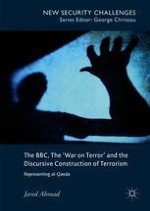2018 | OriginalPaper | Buchkapitel
3. The September 11th 2001 Attacks
verfasst von : Jared Ahmad
Erschienen in: The BBC, The 'War on Terror' and the Discursive Construction of Terrorism
Aktivieren Sie unsere intelligente Suche, um passende Fachinhalte oder Patente zu finden.
Wählen Sie Textabschnitte aus um mit Künstlicher Intelligenz passenden Patente zu finden. powered by
Markieren Sie Textabschnitte, um KI-gestützt weitere passende Inhalte zu finden. powered by
